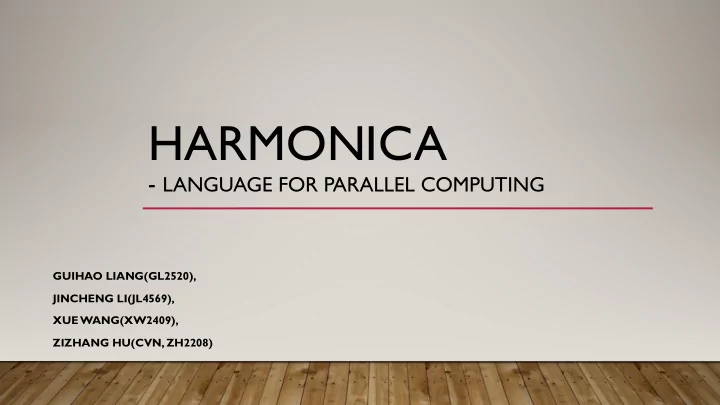

HARMONICA - LANGUAGE FOR PARALLEL COMPUTING GUIHAO LIANG(GL2520), JINCHENG LI(JL4569), XUE WANG(XW2409), ZIZHANG HU(CVN, ZH2208)
THE LANGUAGE • Motivation: • Dominance of multi-processor architectures • Rise of distributed applications and computing on large data sets • Languages with built-in concurrency support are becoming increasingly popular.
THE LANGUAGE • Goal: • Provide easy-to-use primitives for programming parallel programs • Handle large matrix operations / data frame manipulation / signal processing computations efficiently
THE LANGUAGE • Features: • Concurrency support • First-class functions • Compound types (struct) • Standard math library for scientific computing • Container libraries (vector, binary search tree)
COMPILER STRUCTURE • Scanner, Parser: Harmonica => AST • Semant, Codegen: AST => LLVM module • Clang: C => LLVM module • LLVM Linker
RESPONSIBILITIES Guihao Liang parser, C bindings, pthread library, preprocessor Jincheng Li parser, semantic checking, first-class functions, vector/BST libraries Xue Wang testing, documentation, language design, parser Zizhang Hu parser, math library, semantic checking, code generation
FIRST -CLASS FUNCTIONS • Functions are no different from variables • Can be passed as arguments void map(<int int> f, list[int] arr, int length); map(plus1, [1,2,3], 3); • Can be declared as variables and assigned different values bool bar(int x) { x == 3; } <int bool> foo = bar;
LAMBDA EXPRESSIONS • In-line function definitions • Syntax: lambda => argument list => return type => expression <int int> plus1 = lambda (int x) int ( x + 1 ); • Returns one single expression • No closure support right now. OCaml-LLVM seems to lack support for this.
PARALLEL AND MUTEX • Lack of support on Ocaml-LLVM thread bindings, and LLVM system thread documents. • Use Clang as another level of indirection: convert C program to LLVM. • Using POSIX threads to implement parallel and mutex. • Mutex is sort of same as POSIX’s. It’s used for concurrency control. • Parallel takes a function object and a list of arguments, and then spawns threads. # create 4 parallel thread to print out square. void foo(int a) { printi(a * a); parallel(foo, [1,2,3,4], 4);
PARALLEL AND MUTEX • clang -c -pthread -emit-llvm bindings.c • Convert bingings.c to bingings.bc and embed it into LLVM let llmem = L.MemoryBuffer.of_file “bindings.bc” in let llm = Llvm_bitreader.parse_bitcode context llmem in ignore (Llvm_linker.link_modules the_module llm Llvm_linker.Mode.PreserveSource); • Source in bindings.c
TEMPLATE AND PREPROCESSOR • Preprocessor will do context macro replacement before compilation. • alias directives will guide the preprocessor to process template program. • python preprocess.py $@ | ./harmonica.native alias T int struct vector_int { list[int] struct vector_T { elements; list[T] elements; int length; int length; int memsize; int memsize; }; };
TESTING • Test-*.ha cases: expected-to-work • Fail-*.ha cases: expected-to-fail • Run ./testall.sh: • Takes all files starting with test- or fail- and ending with .ha. • Make executable, run them and redirect stdout to corresponding .out files • Check diff between these .out files to ref .out files • If no diff, delete .diff files, returns OK, else keep diff files return FAILED • All test information goes to testall.log
LIRBRARIES (MATH)
LIBRARIES (VECTOR) • Simple dynamic array container • Uses preprocessor macros to accommodate different types • Similar to how you would implement vectors in C
LIBRARIES (BINARY SEARCH TREE) • Basic BST with fine-grained locking struct Node { int value; Node lchild; Node rchild; mutex lock; }; • Safely handles operations from multiple threads
DEMO
FUTURE • Channel • Function Closure • Modules and Namespaces • Better Standard Libraries
Recommend
More recommend